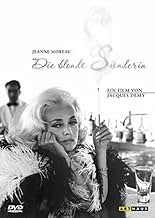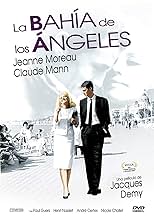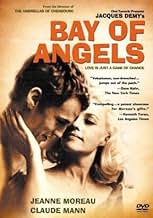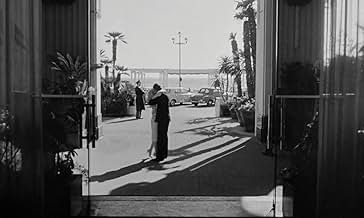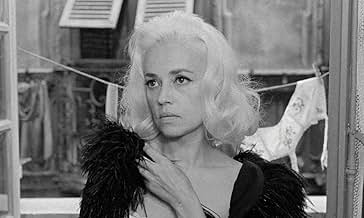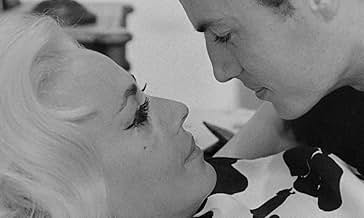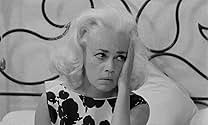NOTE IMDb
7,2/10
4,6 k
MA NOTE
Joueur occasionnel, un employé se laisse griser par les casinos, mais tente de guérir sa maîtresse de ce vice dévorant.Joueur occasionnel, un employé se laisse griser par les casinos, mais tente de guérir sa maîtresse de ce vice dévorant.Joueur occasionnel, un employé se laisse griser par les casinos, mais tente de guérir sa maîtresse de ce vice dévorant.
- Réalisation
- Scénario
- Casting principal
- Récompenses
- 1 victoire au total
Avis à la une
Jacques Demy's "Bay Of Angels" may be the best movie ever made about compulsive gambling, along with the appropriately titled "The Gambler" (1974). It's not "realistic" in its technicalities (winning three consecutive times by betting on a single roulette number happens ONLY in the movies), but I don't think it wants to be; what it's trying to get at is the psychology of gambling, and at that it succeeds (in fact, it shows two different "types" of players: the wetting-his-feet and the full addict). This movie, which offers a rare view of the high and low life in and around the Nice and Monte Carlo casinos circa 1963, has the immediacy and spontaneity that the French New Wave often strived for, minus any of the pretentiousness (just compare it with Godard's not dissimilar "Pierrot Le Fou"). Jeanne Moreau sports an iconic look and plays a daringly flawed female character; the much lesser-known internationally Claude Mann is also very good. It's a minor classic. ***1/2 out of 4.
Although it may not go down too well with Jacques Demy devotees who enjoy seeing his characters burst into song, I consider this to be his most accomplished work. Not only is it close to perfection and technically flawless, no other film has managed to capture so well the agony and ecstasy of gambling.
Jean is introduced by a friend to the roulette tables in Nice and gets the bug. Initially he exercises great self-contol and quits when he's ahead but all that changes when he meets an addictive gambler named Jacqueline. They become lovers and the high and lows they experience in the casino are reflected in their relationship. Here Jeanne Moreau, one of the greatest of French actresses, complete with dyed blonde hair, cigarette holder and outfits from Pierre Cardin, is utterly riveting as Jacqueline and is perfectly complemented by Claude Mann whose first film this is. Excellent script by Demy although by all accounts he had little experience of gambling. Camerawork, editing and production design are exemplary. Unsurprisingly the score is by Michel Legrand whose partnership with Demy is one of cinema's most rewarding.
The gambler's life with its cycles of euphoria and despair and its dramatic fluctuations of luck, is very often frowned upon. Demy does not stoop to moralising but simply presents gambling as a metaphor for living. What this tender, bittersweet and entertaining piece does is to remind us that in the world of the gambler one law reigns supreme:THE HOUSE ALWAYS WINS.
Jean is introduced by a friend to the roulette tables in Nice and gets the bug. Initially he exercises great self-contol and quits when he's ahead but all that changes when he meets an addictive gambler named Jacqueline. They become lovers and the high and lows they experience in the casino are reflected in their relationship. Here Jeanne Moreau, one of the greatest of French actresses, complete with dyed blonde hair, cigarette holder and outfits from Pierre Cardin, is utterly riveting as Jacqueline and is perfectly complemented by Claude Mann whose first film this is. Excellent script by Demy although by all accounts he had little experience of gambling. Camerawork, editing and production design are exemplary. Unsurprisingly the score is by Michel Legrand whose partnership with Demy is one of cinema's most rewarding.
The gambler's life with its cycles of euphoria and despair and its dramatic fluctuations of luck, is very often frowned upon. Demy does not stoop to moralising but simply presents gambling as a metaphor for living. What this tender, bittersweet and entertaining piece does is to remind us that in the world of the gambler one law reigns supreme:THE HOUSE ALWAYS WINS.
Jean is a clerk in a bank. His colleague Caron is a gambler and gives him the virus. In the casinos, Jean meets Jackie. Their love affair will follow their luck at the roulette.
Jacques Demy was still early in his career at this point, having really only made one film, "Lola". He returns here to black and white and a non-musical, the second and last time he would do that. But he always told stories of love and this is no exception. (Some think he had his own take on Hollywood, but that is a whole other issue.)
Here gambling, especially roulette, is glamorized. At a time when gambling was run out of Cuba and was illegal basically everywhere in the United States besides Nevada, there is a sense of mystique about gambling that evokes thoughts of James Bond. This film captures that perfectly.
Jacques Demy was still early in his career at this point, having really only made one film, "Lola". He returns here to black and white and a non-musical, the second and last time he would do that. But he always told stories of love and this is no exception. (Some think he had his own take on Hollywood, but that is a whole other issue.)
Here gambling, especially roulette, is glamorized. At a time when gambling was run out of Cuba and was illegal basically everywhere in the United States besides Nevada, there is a sense of mystique about gambling that evokes thoughts of James Bond. This film captures that perfectly.
I was chilled to the bone, and mesmerized, by the dark crime of M (1931). Then, in the double-feature session, the 15-y-o boy trespassing as a 17-y-o, quickly changed his temperature when the 'great sinner' Jeanne Moreau appeared on La Baie des Anges (1963). «Actress Moreau forcefully demonstrates the verve, style and flamboyant femaless that make her the envy of European sex symbols much greener in years and cooler in blood. Her wicked, winning presence has saved a bad movie from utter oblivion, and at 36 she knows how to turn Bay of the Angels into a one woman show.» So wrote a reviewer (Time, November 27, 1964), and I couldn't put it better; I'm now copying this from my typewritten notes - no photocopier at home, then. That young boy would never enter a casino in his life due to this film, and he tried to see all the films starring Jeanne Moreau. I'm a winner on two counts, by money not given away to casino owners, and by a plethora of good films that were saved from oblivion by this great woman, and actress.
Boy, take Demy away from musicals and he becomes one rather somber director, huh? In other words, I disagree with the previous reviewer, theognis 80821, who described this very bleak study of two chronic gamblers as "fun". In fact, it's so un fun that I sedulously did not buy the tacked on happy ending when Jeanne Moreau's walking ad for gamblers anonymous suddenly and inexplicably decides to renounce roulette for stolid Claude Mann (who may look like Belmondo but does not resemble his acting).
However, until that cloying last scene Demy does not hit a false note as he relentlessly chronicles the toll this insidious addiction takes on a woman of intelligence and sensitivity to the point where husband and child are tragically renounced for momentary highs at expensive and tawdry casinos. And Moreau's great performance ensures that you experience the full ugliness of it. Give it a B plus which would have been higher without that sappy ending and a different actor in the lead opposite Ms. Moreau.
However, until that cloying last scene Demy does not hit a false note as he relentlessly chronicles the toll this insidious addiction takes on a woman of intelligence and sensitivity to the point where husband and child are tragically renounced for momentary highs at expensive and tawdry casinos. And Moreau's great performance ensures that you experience the full ugliness of it. Give it a B plus which would have been higher without that sappy ending and a different actor in the lead opposite Ms. Moreau.
Le saviez-vous
- AnecdotesAccording to Agnès Varda, Jacques Demy had little to no experience gambling prior to making this film. Although another source states Demy decided to make the movie after winning a large bet placed on the number 17. Jackie's lucky number is also 17.
- Citations
[English subtitled version]
Jean Fournier: I've been the studious, mild-mannered boy up until now. That's over now. I need something else.
- ConnexionsFeatured in Jacquot de Nantes (1991)
Meilleurs choix
Connectez-vous pour évaluer et suivre la liste de favoris afin de recevoir des recommandations personnalisées
- How long is Bay of Angels?Alimenté par Alexa
Détails
- Date de sortie
- Pays d’origine
- Site officiel
- Langue
- Aussi connu sous le nom de
- Bay of Angels
- Lieux de tournage
- Société de production
- Voir plus de crédits d'entreprise sur IMDbPro
Box-office
- Montant brut aux États-Unis et au Canada
- 85 840 $US
- Montant brut mondial
- 85 840 $US
- Durée
- 1h 30min(90 min)
- Couleur
- Mixage
Contribuer à cette page
Suggérer une modification ou ajouter du contenu manquant

